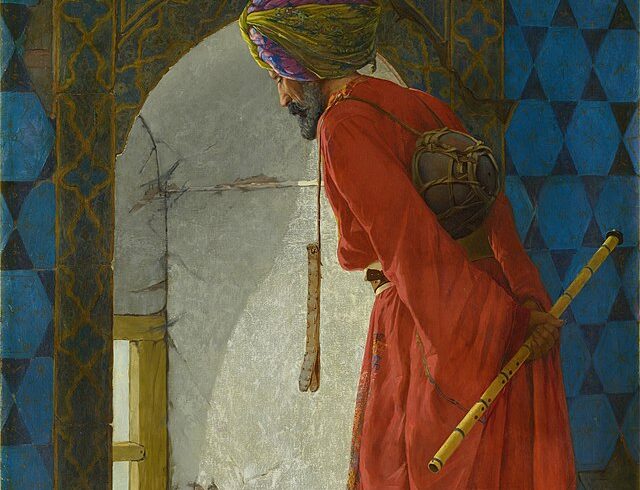Kemal İnal* – TURKEY
picture: Wikimedia Commons: Osman Hamdi Bey –
The Tortoise Trainer – Google Art Project.jpg
The new curriculum model prepared by the Turkish Ministry of National Education, which applies to all formal levels of education, has been widely discussed by the public1. The debates generally focused on a criticism of values education from the left, based on secularist concerns. The new curriculum, which is against secularism, science and civilization, is a religious social engineering project to raise a new Muslim people through a values education that is articulated within the framework of various Islamic concepts. The view of the future in the curriculum was declared “outdated” for allegedly containing a retrospective perspective in the context of a conservative glorification of the past. Here, “era” or “modernity” roughly refers to the values of Western civilization, that is, a universal perspective (a perspective that transcends all national, local and ethnic affiliations). The leftist public opinion actually placed the new curriculum in an anti-Western category, claiming that instead of this universal scope, it contained a narrow perspective based on Islamic values. Here, the West is actually understood as a line expressed by many other sociological concepts (universality, modernism, secularism, human rights, pluralism, multiculturalism, etc.). In this context education is seen as a “line of resistance” against the Western world, and it is used as an Althusserian ideological state apparatus and put to work as a comprehensive Islamic social engineering tool. In a sense, this can be interpreted in the context of Samuel Huntington’s “clash of civilizations” as a “clash of culture”, which refers to Islam’s war against the West, primarily using religious symbols (the crescent’s war against the crusader). AKP (which can be read as Erdoğan), in its first new curriculum two years after coming to power in 2002, envisioned education as a line of ideological resistance against any threat from the West. Thus, in the “national education system” (basic education), which was treated as a “flagpole” (the symbol of Turkish nationalism), the thick part of the flagpole which is closer to the ground/soil symbolized primary education, which would be resistant to the winds of globalization. The Islamic and Turkish nationalist values education was to take place in this very first part. The upper parts of the flagpole would be thinner, making it less vulnerable to global winds and therefore more flexible. In other words, the lower part of the flagpole would be more of an ideological education zone, while the upper part of the flagpole would be a zone for higher education (universities, scientific studies, etc.) open to the world.
However, in the 2024 curriculum, the old metaphor was changed and the flagpole was replaced by a “rooted tree”. The main point in the metaphor of the “rooted tree”, so beloved by conservatives and nationalists, was that the roots of the tree, the Islamic- national values, were grounded on Turkish soil. Accordingly, all technical aspects of the primary and secondary curriculum (knowledge, skills, abilities, technology, various qualifications, etc.) were to be based on these values. This meant that the technique of the West would be overlaid on Islamic values, but this was not a synthesis or hybridization, but rather the establishment of Western civilization on Islamic values. In this context, the fact that Islamic values, in the form of roots, foundations and solidity, are embedded on the soil of Turkey/ Anatolia is considered as a trait or virtue, applauded and transferred to the curriculum as a form of social engineering. Even though a bridge is being built between the technical reason of the West (rationalization) and the deep insight-based imagination of Islam (spirituality), this bridge is actually an instrumentalization rather than a dialogue, interaction and cooperation: The virtues of the West (human rights, technology, technical intelligence, rationality, etc.) are both underestimated and instrumentalized as they do not contain any essence, value or virtue. So there is a cultural reflex here that dates back to the Ottoman Empire. In this view, the salvation for an increasingly weakened Islamic/Ottoman/Turkey is to return to its essence in a more authentic manner, to preserve its old identity and to preserve its past values. This tendency, clearly visible in the background of the new curriculum, in fact contains a so-called “prescription for salvation” after the fall of the Ottoman Empire and the collapse of Turkey under Erdoğan in every field. The belief that Turkey can be saved by returning to Islam and religious values leads to education being treated as an Islamic ideological state apparatus rather than a rational pedagogy. For official education to encircle the civilian sphere, education must play a role as the ideological apparatus of a statist Islam.
During Erdoğan’s administration, since 2002, many policies such as increasing the number of religion lessons from one to four, removing Darwin’s theory of evolution from the curriculum and textbooks, selecting all school administrators from among graduates of religious faculties, opening religious mosques in every (secular) school, and introducing the teaching of religious values at all levels of education have been significant strikes against the secular character of education. The new curriculum seeks to further reinforce anti-secular education in the context of Islamic social engineering and the raising of conservative generations. Erdoğan’s government has failed to respond to Turkey’s social and economic crises by improving democracy, law and the economy, and has chosen to respond to the material crisis with a spiritual solution, namely the spread of Islam in education like an octopus. It is very meaningful that the new curriculum is referred to with an old/Ottoman term like “maarif ”. The term “Maarif ” is based on a traditional understanding of upbringing that does not accept the concept of the ‘modern individual’ as it is ‘wise human’, that is, ‘Muslim human’. Seeing the state/government, the imam, the authoritarian father, and increasingly the main guide, God, as the basic education within a paternalistic philosophy indicates a move against the emancipation of the individual. Therefore, the new curriculum does not aim at the freedom of the individual, but at the upbringing of the (religious) believer. The national education system, which is assigned the task of raising a “religious generation”, does not accept the category of citizen, a product of the Enlightenment, for being based on universal, that is, rootless and contextless values. The citizen is a concept of the modern individual who prioritizes his/her emancipation. The opposite of this is the “believer”, the obedient person. Therefore, a believer-based spirituality criticizes citizen-based materialism as rootless, atheistic and corrupt.
In conclusion, the religion-oriented references in the new curriculum represent a culture war against secular education. In this context, education has lost its liberating characteristic and has been reduced to the tool of Islamic social engineering that emphasizes obedience, allegiance and conformity. Using the metaphor of a tree and basing all knowledge, skills and abilities on Islamic values indicates that the aim of the new curriculum is not education but Islamization.
* Affiliated Researcher at Helmut Schmidt University, Hamburg











